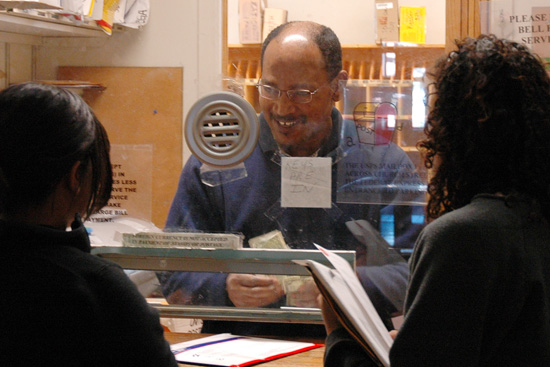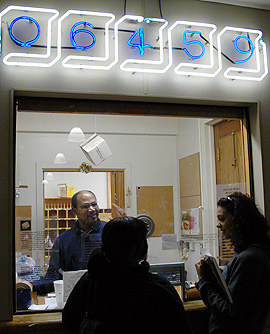Postal Clerk Expert on Haitian Music, Celebration
 |
| Holly Nicolas, postal clerk at Wesleyan Station, helps two students send their mail. He was recently featured on Afropop Worldwide Radio. |
| Posted 04/02/07 |
| Its 20 minutes after noon and postal clerk Holly Nicolas heads to the Wesleyan Station window. Students begin trickling into a line. Some want to send letters, others wait to pick up packages.
When the students get out of class, we really get hit, Nicolas says in his Creole-accented English.
Its fun to interact with the universitys faculty, staff and students every day, and I like when I can put a face with a name, Nicolas says. Working here, you see peoples names over and over and its good to know who they are. The students are surprised when I can know their mailbox number off the top of my head, but when you look at them every day; it stays in your head. If a mail carrier is out, Nicolas often volunteers to deliver the campus-wide mail. Hell also work on mail forwarding and sorting mail throughout the day. The heaviest mail season occurs during the first few weeks of the academic year. During this time, tons and tons of packages arrive to Wesleyan Station containing students clothing and school supplies, Nicolas says. The mail traffic slows, but picks up again around Feb. 14. Valentines Day is so busy, Nicolas says, smiling. There are lots and lots of flowers to deliver. In addition to his mail duties, Nicolas has one other job requirement playing the role of deejay for Wesleyan Station. The lifelong music lover is an expert on Haitian beats, from traditional kompa dance music to band a pied, which is played with brass horns and drums. Holly is a very important person here, explains Konerding. He is great with the customers, fixes anything that breaks around here, and most importantly, he is in charge of all of our music. In February, Nicolas was featured on Afropop Worldwide Radio. The interview of Nicolas was conducted by Sean Barlow 79, president of World Music Productions/Afropop Worldwide Radio in Brooklyn, and freelance guitarist and Afropop Worldwide host Banning Eyre 80. The recording is online here. Nicholas talked about his memories of Haitian Carnival. The carnival season begins Jan. 6 on Three Kings Day and runs until Fat Tuesday. During the last three days of this period, some Haitians dress in colorful costumes and dance, sing, dance and celebrate their culture. The celebration was a tradition for Nicolas, who grew up in Ouanaminthe, a small town that borders the Dominican Republic on the northeast of Haiti. During one carnival, he recalls, local musicians sang about a woman who stole a chicken. That was funny to me, because I knew that woman. She lived next to me, he says. This is Nicolas eighth year working at Wesleyan. In the early 1990s, he met Wesleyans Elizabeth McAlister, associate professor religion, African American Studies and American Studies. McAlister was in Haiti, studying Haitian traditions and Voodoo. The couple married and spent three years trying to get Nicolas daughter, Lovely, to America. She is now 20 and a sophomore at Hampshire College. Nicolas and McAlister live in Middletown with their children, Sacha, 13, and Julien, 8. He enjoys cooking Haitian food for his family and playing intramural soccer. He returns to his native country once a year but never regrets moving to the U.S. Moving to American was a good move for me, but it was especially a good move for my daughter, who now lives in a safer environment with better educational opportunities, he says. We are both very fortunate. |
| By Olivia Drake, The Wesleyan Connection editor |


 Holly, pronounced O-Lee, is a Haitian native who moved to the United States in 1993. His days begin with sorting incoming mail for the universitys faculty, staff and students. At 10 a.m., Wesleyan Station opens and Nicolas, fellow postal clerk Illana Konerding and student workers service the window until it closes at 3 p.m.
Holly, pronounced O-Lee, is a Haitian native who moved to the United States in 1993. His days begin with sorting incoming mail for the universitys faculty, staff and students. At 10 a.m., Wesleyan Station opens and Nicolas, fellow postal clerk Illana Konerding and student workers service the window until it closes at 3 p.m.